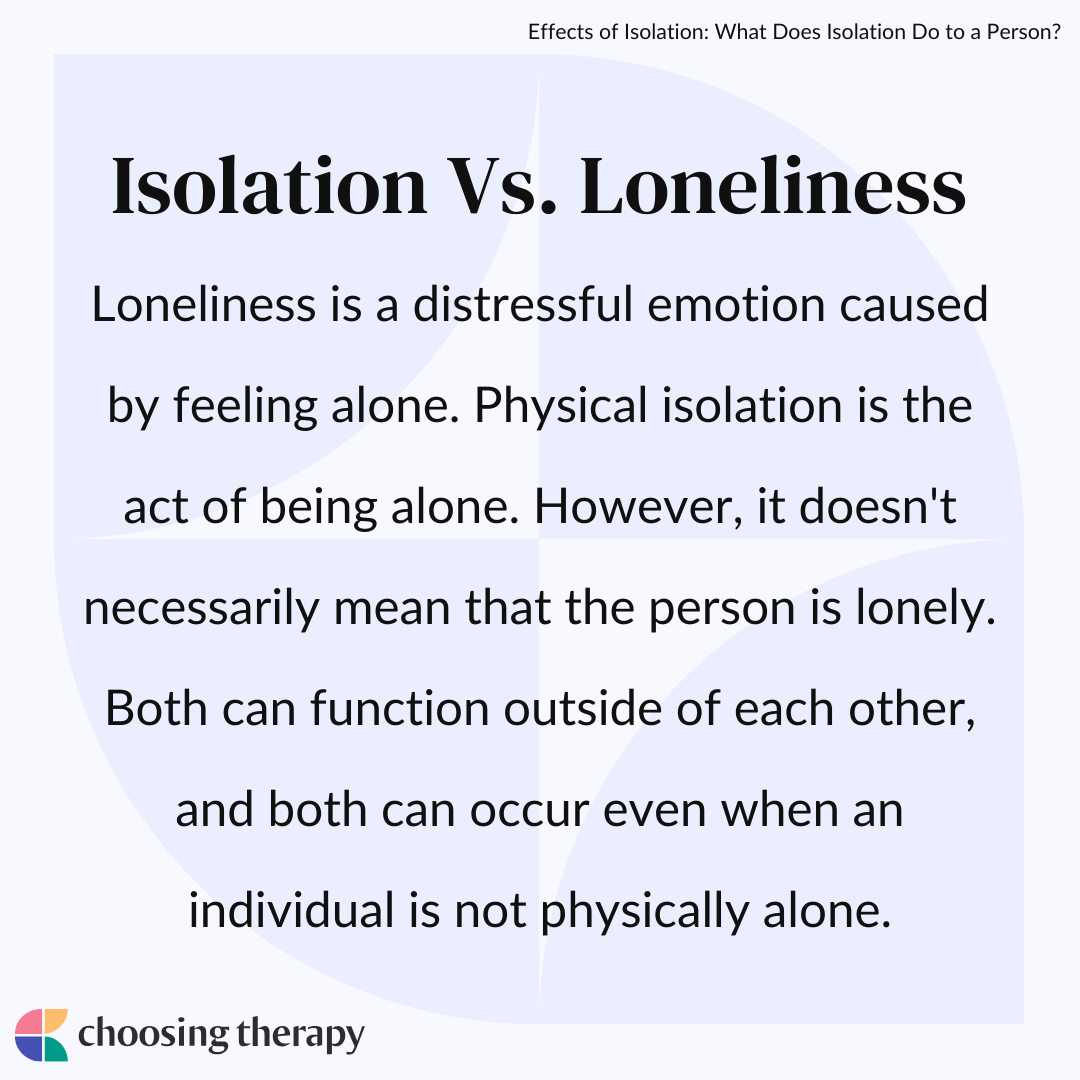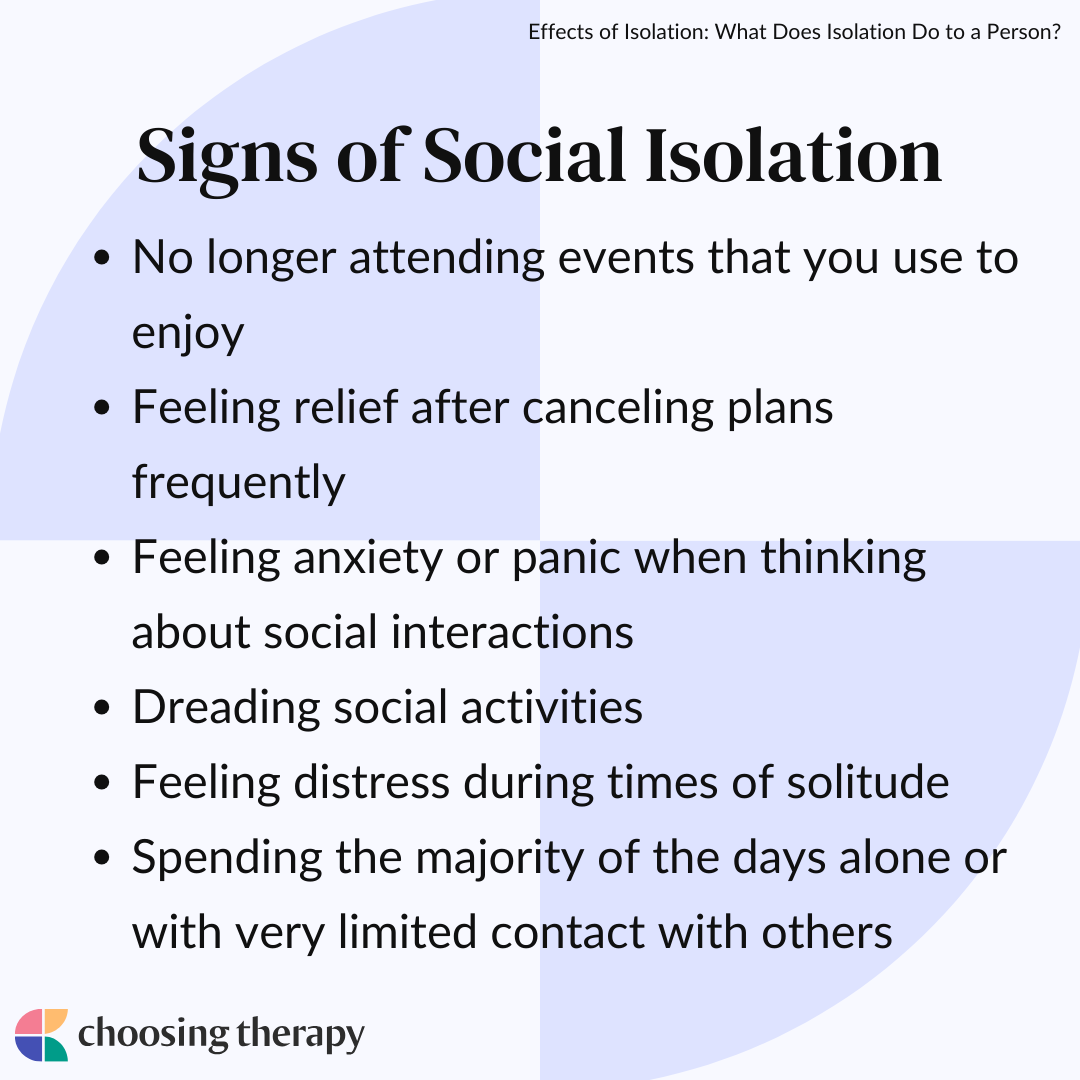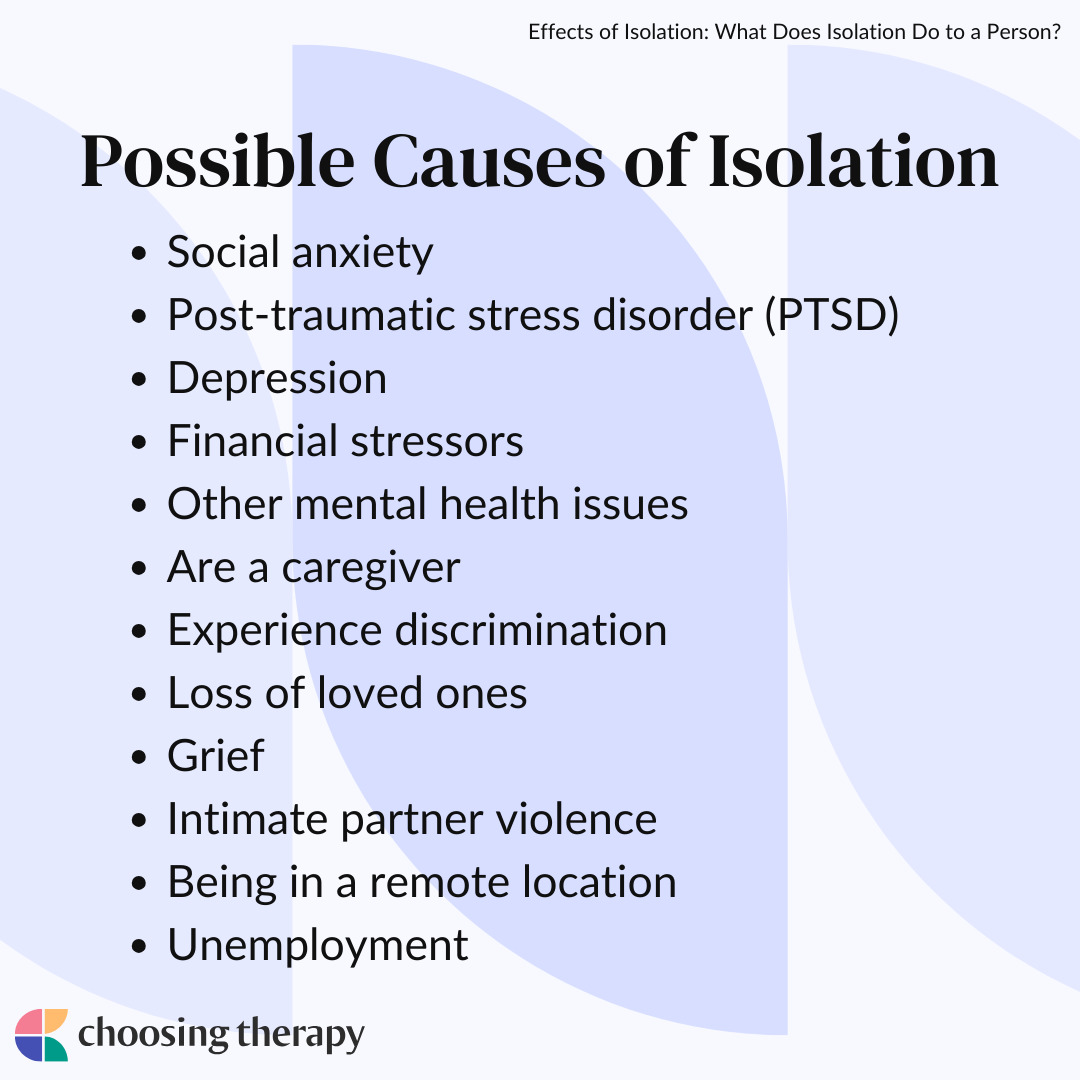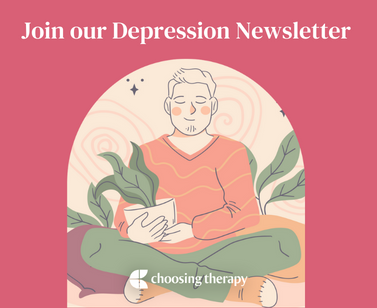When a person isolates and secludes themselves from others, especially when done for a long period of time, can have physical and emotional consequences. There are also certain factors like age, environment, marginalization, and socio-economic that increase the risk of social isolation.
Depression Is Treatable With Therapy Would you like to feel more happiness and joy? BetterHelp has over 20,000 licensed therapists who provide convenient and affordable online therapy. BetterHelp starts at $65 per week. Take a Free Online Assessment and get matched with the right therapist for you.
What Is Isolation?
Isolation is when an individual is disconnected from others, whether intentionally or by circumstance.1 The person may actively choose to isolate themselves for many reasons or may be excluded by others. There are many different factors that can influence isolation like geographical restrictions, social distancing, cultural isolation, and technological isolation.
As people have started working remotely and after the changes that occurred from social distancing, isolation has become more prevalent. Humans are social creatures, and isolation can have many mental, emotional, and even physical negative impacts.
Isolation Vs. Loneliness
Loneliness is a distressful emotion caused by feeling alone. Physical isolation is the act of being alone. However, it doesn’t necessarily mean that the person is lonely.
Both can function outside of each other, and both can occur even when an individual is not physically alone.
In a crowd of people, when we sense an emotional disconnect or feel secluded, it can lead to a profound sense of isolation. If this internalized isolation persists, it has the potential to transform into loneliness—an emotional reaction rooted in a sense of detachment and alienation.
Signs of Social Isolation
It’s not uncommon to isolate ourselves from social interactions and to want solitude at times. Having time alone can be beneficial and relaxing. When Social isolation or self-isolation occurs, it is more commonly unwanted and impacts mental and emotional health.
Signs of social isolation include:2
- No longer attending events that you use to enjoy
- Feeling relief after canceling plans frequently
- Feeling anxiety or panic when thinking about social interactions
- Dreading social activities
- Feeling distress during times of solitude
- Spending the majority of the days alone or with very limited contact with others
Causes of Isolation
Isolation can be influenced by many factors and can impact anyone. It can be caused by life experiences or be a symptom of a mental health disorder, and once isolation starts, it can be challenging to break the cycle. Below are a few common causes of isolation.
Possible causes of isolation include:2, 3
- Social anxiety
- Post-Traumatic Stress Disorder (PTSD)
- Depression
- Financial stressors
- Other mental health issues
- Are a caregiver
- Experience discrimination
- Loss of loved ones
- Grief
- Intimate partner violence
- Being in a remote location
- Unemployment
Physical Health Consequences of Isolation
As isolation occurs, it can also cause the person to feel trapped and unable to find ways to reconnect with others. Because of this trapped feeling, isolation can persist for extended periods of time. The longer a person experiences isolation, the more at risk they are for physical health consequences. People need connection and support and without it, the long term effects of the hormones caused by anxiety and depression take a toll on the body and mind.
Some groups, like those that have been historically marginalized and the elderly, are at an increased risk of physical effects when experiencing social isolation. The physical impacts of isolation can be an increase in heart disease, neurocognitive disorder, weakened immune function, and a shortened life span.4, 3
Help For Depression BetterHelp – Get help from a licensed therapist. BetterHelp offers convenient and affordable online therapy starting at $65 per week. Free Assessment Talkspace – Online Therapy With Or Without Insurance. Talkspace accepts many insurance plans including Optum, Cigna, and Aetna. Typical co-pay is $30, but often less. Get started
Psychological Effects of Social Isolation
Social isolation has many negative effects, including psychological impairments. Connection has many positive effects on humans, and when that is cut off, it impacts our ability to regulate how we feel about ourselves, and leaves us vulnerable to mental health issues.
Psychological effects of isolation include:3, 5
- Increased risk of depression
- Increased risk of anxiety
- Increased risk of suicide
- Increased risk of self-harm
- Increased risk of addiction and substance abuse
Depression & Anxiety
Those struggling with depression are at an increased risk of social isolation, which then exacerbates the symptoms. A study done with older adults showed an increase in depressive symptoms when separated from both family and friends.6 Similar results have been found with adolescents. One article mentions that depression occurs when the individual feels lonely during their experiences with social isolation.7
Similarly, anxiety can be caused by social isolation and also be amplified by it. Studies done on individuals following the pandemic showed an increase in anxiety.8 This was especially noticed in women, younger participants, and those who are single, divorced, or widowed.8 Social isolation has a severe impact.
Impact on Cognitive Functions
According to studies, long-term social isolation was associated with lower cognitive test results in older adults. This study was done over a 3-year period where the participants showed a decrease in cognitive functioning.9 This impacted the individual’s functioning in memory, attention, verbal communication, and problem-solving skills.
Social & Emotional Impacts of Isolation
As a person goes through social isolation, it can be difficult to reintegrate into social scenarios, especially if the mental health conditions have become exacerbated. Long periods of isolation can lead to emotional detachment and numbness, limiting the person’s motivation to attempt to reconnect with friends and family. If there was originally anxiety around socializing, avoiding those situations can heighten the anxiety’s physiological response when thinking about stepping out of seclusion.
Coping Strategies for Isolation
Isolation can be consuming and feel like a never-ending cycle. In order to maintain mental and physical health, it’s important to identify ways to break free and begin connecting and engaging in life again. This can look like creating a routine for yourself that involves moments of connection, even if simply asking the cashier how their day is going, engaging in movement, and seeking professional help if needed.
Ways to cope with and overcome isolation include:
- Reach out via text or social media to friends and family
- Resume an old hobby, or pick a new one up
- Establish a daily routine
- Find ways to get involved in your community
- Limit your time on social media
- Try to stay active
- Create to-do lists that give you reasons to get out of the house
- Limit screen time
- Let friends and family know what you’re experiencing
How Technology Can Help Prevent Isolation
Technology comes with its pros and cons, and even though it is important to monitor and limit screen time, it can be used to help mitigate the isolation. Technology removes barriers to social interaction like transportation, disabilities, and financial constraints, amongst others.
Technology can be a resource that allows individuals to connect more frequently, connect people that may not otherwise meet due to geographical location, and it can offer therapeutic support through groups, meetups, and teletherapy sessions. When used appropriately, it can be a game changer for mental health and social isolation.
When to Seek Professional Help
If you’re struggling to break the cycle of isolation, you’re noticing yourself feeling increasingly anxious about interacting with others or you’re constantly feeling down, a lack of energy, and not enjoying things that you did before, then it is time to consider seeking out professional help. Especially if what you’re experiencing is causing feelings of hopelessness or you are struggling to find a purpose in life.
Social isolation and the emotional and physical components that accompany it are serious, and there are specialists who can help you work through the underlying causes. online therapist directory and online therapy platforms can help assist in finding the support necessary. Seeking additional support with a psychiatrist can help offer additional assistance with managing the symptoms of isolation. Here is more information on online psychiatrist options.
In My Experience
To help our readers take the next step in their mental health journey, Choosing Therapy has partnered with leaders in mental health and wellness. Choosing Therapy is compensated for marketing by the companies included below. Talk Therapy Online-Therapy.com – Get support and guidance from a licensed therapist. Online-Therapy.com provides 45 minute weekly video sessions and unlimited text messaging with your therapist for only $64/week. Get Started Online Psychiatry Hims / Hers If you’re living with anxiety or depression, finding the right medication match may make all the difference. Connect with a licensed healthcare provider in just 12 – 48 hours. Explore FDA-approved treatment options and get free shipping, if prescribed. No insurance required. Get Started Depression Newsletter A free newsletter from Choosing Therapy for those impacted by depression. Get helpful tips and the latest information. Sign Up Learn Anti-Stress & Relaxation Techniques Mindfulness.com – Change your life by practicing mindfulness. In a few minutes a day, you can start developing mindfulness and meditation skills. Free Trial Choosing Therapy Directory You can search for therapists by specialty, experience, insurance, or price, and location. Find a therapist today.Additional Resources
Online Depression Test A few questions from Talkiatry can help you understand your symptoms and give you a recommendation for what to do next. Best Online Psychiatry Services Online psychiatry, sometimes called telepsychiatry, platforms offer medication management by phone, video, or secure messaging for a variety of mental health conditions. In some cases, online psychiatry may be more affordable than seeing an in-person provider. Mental health treatment has expanded to include many online psychiatry and therapy services. With so many choices, it can feel overwhelming to find the one that is right for you.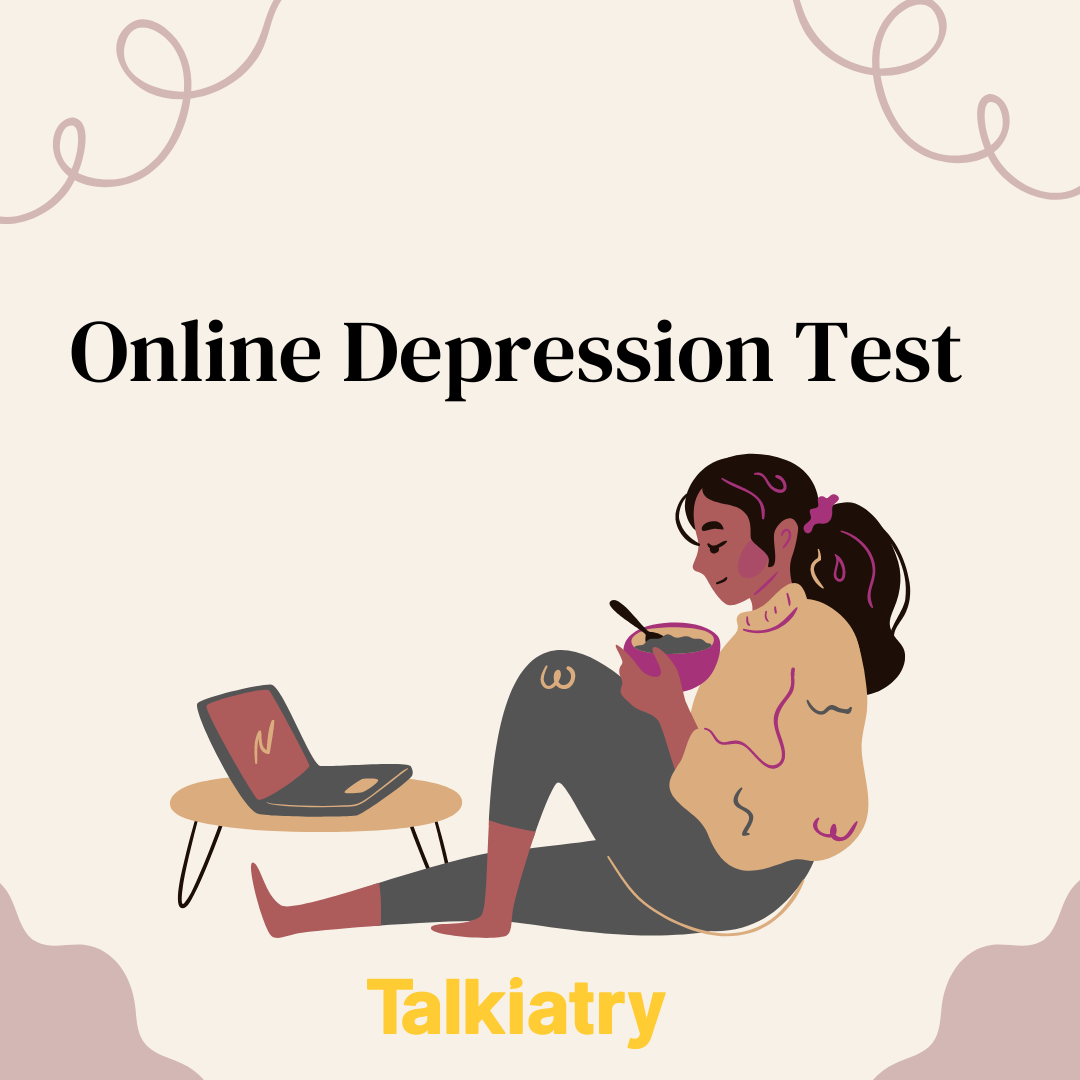

Effects of Isolation Infographics
